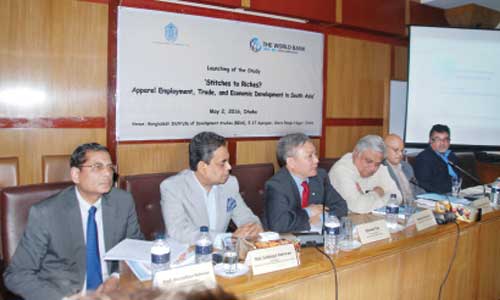Chinese apparel price on rise: B’desh to benefit less than SE Asia due to poor competitiveness: WB
As Bangladesh lags behind Vietnam, Cambodia and Indonesia in competitiveness, a rise in Chinese apparel prices would offer more benefits to the Southeast Asian countries, according to a World Bank report released on Monday.
According to the report, a 10 per cent increase in Chinese apparel prices would raise the Southeast Asian countries’ export to the US by 37-51 per cent, while the export of South Asian countries would grow by 13-25 per cent (depending on the country) due to barriers to importing manmade fibres and poor exporting logistics.
The report titled ‘Stitches to Riches? Apparel Employment, Trade and Economic Development in South Asia’ shows that the rank of Vietnam and Cambodia in terms of quality, lead time and social compliance are higher than the South Asian countries like Bangladesh and India.
According to the report, the Southeast Asian countries have gained more competitiveness on cost-related factors.
Though the wage structure in Bangladesh is the lowest, the worker’s productivity in Vietnam, Cambodia and Indonesian is higher than Bangladesh and India, the report said.
The WB said Bangladesh has steadily increased its share of global apparel trade above the world average and greater than China, but lower than that of the Southeast Asian countries.
It said that a 10 per cent increase in Chinese apparel prices in the US market would increase employment in Bangladesh by 4.22 per cent in the sector but for the EU market, apparel employment would drop by 0.74
percent for males and 0.77 percent for females.
According to the report the employment of Bangladesh for the EU market would experience small decrease because country’s trade estimates do not imply that Bangladesh is close substitute for Chinese apparel products in the EU market.
According to the report, a 10 per cent increase in Chinese export prices would result in the US increasing imports from India and Bangladesh by 14.62 per cent and 13.58 per cent respectively.
South Asia’s competitor countries would benefit even more from rising Chinese prices and Vietnam’s exports would increase by 37.70 per cent and Cambodia’s by 51.25 per cent.
The report also said that rising Chinese apparel prices would have little, if any, effect on Bangladeshi and Pakistani exports to the EU.
According to the report, a 1 per cent increase in apparel output is associated with a 0.3-0.4 per cent rise in employment (for both men and women) in Bangladesh, Pakistan, and Sri Lanka.
The report highlighted that Bangladesh needs to improve performance on non-cost factors important to global buyers.
‘Successfully implementing reforms will help Bangladesh increase exports and capture more jobs from China’s gradual exit from the clothing market and compete with Vietnam, Cambodia, and Indonesia,’ the WB said.
To expand apparel exports and jobs in South Asia, the report suggested adopting policies to increase market access, ease import barriers for manmade fibre, improve export logistics, and facilitate foreign investment.
‘If it fails to do so—and fails to do so quickly—it risks losing out on a huge opportunity to create good jobs for development given by China’s rising apparel prices,’ the report said.
Centre for Policy Dialogue executive director Mustafizur Rahman said Bangladesh needs to give attention on productivity, market diversification, and product diversification.
He said the global market scenario is changing, and Bangladesh would have to increase the use of manmade fibre to remain competitive.
The apparel sector in Bangladesh needs targeted policy support, Mustafiz said, adding that it should not be market-driven. ‘We will have to think about what should be the strategy in Industrial policy.’
WB Bangladesh country director Qimio Fan remarked, ‘The apparel sector in Bangladesh tells a remarkable story of women’s empowerment by significantly increasing female participation in the labour force.’ He hoped that the potential decrease in Chinese export presents a huge opportunity for Bangladesh, if the country can meet the requirements of global buyers on cost, quality, lead time, reliability, and compliance.
Gladys Lopez-Acevedo, a World Bank lead economist, presented the report at a programme in the Bangladesh Institute of Development Studies auditorium in the city.
Prime minister’ adviser Mashiur Rahman and Bangladesh Garment Manufacturers and Exporters Association president Md Siddiqur Rahman also spoke at the session
News Courtesy: www.newagebd.net











